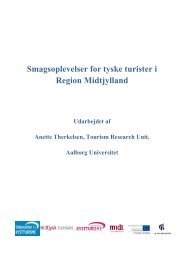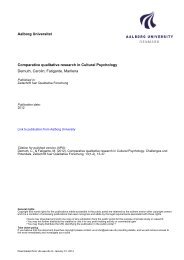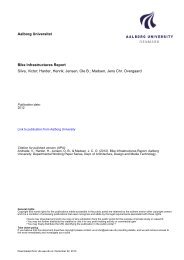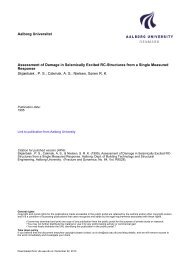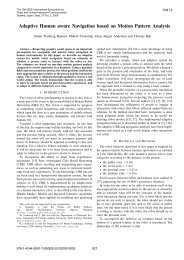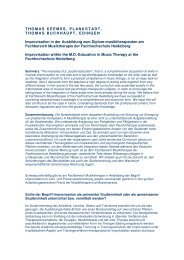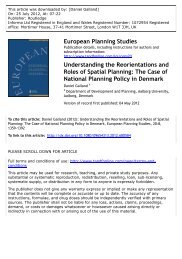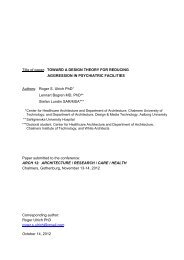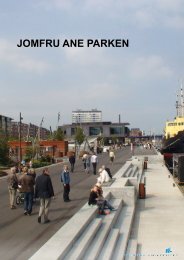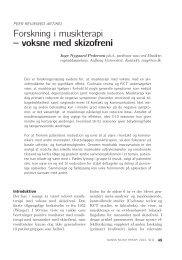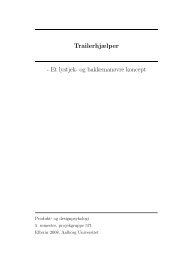Optimisation of Marine Boilers using Model-based Multivariable ...
Optimisation of Marine Boilers using Model-based Multivariable ...
Optimisation of Marine Boilers using Model-based Multivariable ...
Create successful ePaper yourself
Turn your PDF publications into a flip-book with our unique Google optimized e-Paper software.
12 1. INTRODUCTION<br />
there are methods such as the autocovariance least-squares method for estimating noise<br />
covariances [Odelson et al., 2006a,b]. Another method which we will use on the marine<br />
boiler example is the loop transfer recovery (LTR) method (the LQG/LTR approach).<br />
Notes on LTR can be found in e.g. [Doyle and Stein, 1981; Maciejowski, 1985, 2001,<br />
1989; Saberi et al., 1993]. This approach is for linear controllers, however, for an<br />
example <strong>of</strong> application to MPC, see [Rowe and Maciejowski, 1999].<br />
Robustness and nonlinearity Work has also been carried out in the area <strong>of</strong> robust<br />
model predictive control. However, this direction is still in the development phase and<br />
not yet suited for industrial applications. Two sources <strong>of</strong> uncertainty are dealt with<br />
in the robust predictive control framework: model uncertainty and uncertainty with<br />
respect to disturbances – see e.g. [Chisci et al., 2001; Gaulart and Kerrigan, 2006;<br />
Kothare et al., 1996; Smith, 2006].<br />
As mentioned earlier this thesis deals with MPC <strong>using</strong> linear models. However, such<br />
schemes only work well when the nonlinear system to be controlled is working around<br />
an operating point. When the operating point is changed from the nominal situation,<br />
the controller might not perform well due to model mismatch. One way <strong>of</strong> tackling this<br />
by still <strong>using</strong> linear models is to switch among a set <strong>of</strong> these according to the current<br />
plant state. Examples <strong>of</strong> this can be found in e.g. [Kothare et al., 2000; Pedret et al.,<br />
2000] where the latter refers to this method as model-varying predictive control. This<br />
method has not been used in this thesis but might become relevant in the future.<br />
There exists a number <strong>of</strong> tools to assist the engineer in performing design, analysis and<br />
development <strong>of</strong> his MPC controller. The ones that have been used in this thesis, apart<br />
from the authors own algorithms, are the multi-parametric toolbox (MPT-toolbox),<br />
[Kvasnica et al., 2004] and the MPC-toolbox from the The MathWorks , [Bemporad<br />
et al., 2006], which are both s<strong>of</strong>tware packages for MATLAB � .<br />
Hybrid/switching control<br />
In many industrial processes, e.g. the thermodynamical and chemical processes a mixture<br />
<strong>of</strong> on/<strong>of</strong>f valves and heating elements might be present. When describing such<br />
systems they fall into the class <strong>of</strong> hybrid systems. The marine boiler is such a system as<br />
both the burner and feed water valve can be operated continuously down to some minimum<br />
level whereafter the output from these systems must be switched <strong>of</strong>f to reduce<br />
the load further. This means that when operated at low load some switching control<br />
must take place. Traditional methods for controlling such systems are hysteresis control<br />
and pulse width modulation (PWM). However, both these methods have a number<br />
<strong>of</strong> shortcomings discussed in [Solberg et al., 2008a]. For the feed water system these<br />
shortcomings are not crucial and here we shall use PWM. However, for the burner system<br />
things are more complicated, and in this thesis we will investigate how to optimally<br />
control processes which require switching control.<br />
A special property <strong>of</strong> the systems with discrete inputs is that in some cases the optimal



